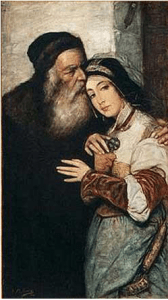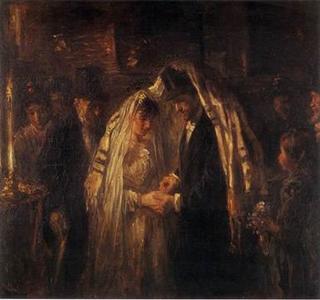A story is told about a bachur (an unmarried young man) who came in the 60s to the Lubavitcher Rebbe for the yechidus (private audience) telling the Rebbe that he wanted to go college. Those days, American colleges, by and large, were not exactly institutions of higher learning but, more often, venues for drugs, sex, and rock and roll. The Rebbe strongly advised the visitor against going to college, but the young man was hell-bound on going through with his plan. The Rebbe said to him, “Even if you don’t care about the spiritual dangers and impurity of such a place, I do! And you and I are connected. Why are you dragging me along with you?!” The moral of that story is simple—chasidim and their Rebbe are entangled together. Wherever a chasid goes, he drags his Rebbe along with him.
In the Biblical narrative of the creation of the first couple, Adam and Eve (Chavah), the Torah says:
“…A man shall leave his father and his mother, and cleave to his wife, and they shall become one flesh.” (Geneses 2:24)
I would instead translate this verse as, “…a man shall disentangle himself from his father and his mother, and entangle himself to his wife, and they shall become one flesh.” (Yes, I know that Torah uses two different words: יַעֲזָב, i.e., “he shall leave,” and דבַק, i.e., “glue”; but these are two different kinds of entanglement so it is no wonder that Torah uses different words.) Indeed, the nature of entanglement in quantum mechanics is that two separate objects become one (more precisely, they share one wave function) through interaction. The end of the verse “and they shall become one flesh” hints at the entanglement.

Similarly, a husband he hears a neder made by his wife has the power to annul her vow. Again, the simple reason appears to be that the wife belongs to her husband who has the power to annul her vow.
In his classic commentary on the Torah, the Ramban (Nachmanides) explains that a man can only annul those nedarim (vows) of his daughter or his wife that fall into one of two categories: (a) when the woman denies herself some pleasure (e. g., the daughter vows not to eat meat); or (b) it affects in some way the man himself (e. g., a wife vows not to have marital relations with her husband). (Ramban al HaTorah, Numbers 30:14)
The latter category is easy to understand. When a woman takes a vow that affects her father or her husband without their informed consent, the father (or the husbands as the case may be) does not have to agree to the vow imposed on him and is given the power and to annul the vow. Just as the Rebbe told the young man, “Why are you dragging me where I don’t want to go?!” in our case, a husband tells his wife, “Why are you dragging me where I don’t want to go? Why are you imposing on me a vow I don’t want to take?!”
The former category, however, is more difficult to understand. If the vow concerns the woman’s pleasure and does not concern her father or her husband, why should they care? And, consequently, why should they be given the power to annul a vow in a case that doesn’t concern them? The simple rationale for that is that the pain the woman causes herself through a vow automatically causes pain to her father of her husband. Why? Because they are entangled.
What of a girl who is betrothed? After the engagement the girl becomes a kalah (bride)—she is forbidden for everyone else, but not yet permitted for her chasan (groom). According to Jewish law, this girl is now in a state of superposition, something like the Schrödinger cat. Likely for the girl, she is not half-dead and half-alive, like the cat, she is simply partly married and partly not. A betrothed girl is at the same time, partly the property of her father and partly the property of her future husband. This ambiguity (superposition of states in physics-speak) creates dual entanglement whereby she is entangled with both her father and her husband-to-be.
The Torah says that if a betrothed woman makes a vow, it requires both of these men—the father and the future husband—to annul the vow. But why? If this is, for example, a case of a woman taking a neder le’anos nafesh (a vow to cause herself pain by denying herself some pleasure), both her father and her future husband are presumed to be pained by it. It would seem only logical if any one of them could annul the woman’s vow. Similarly, if a woman takes a vow that affects both her father and her husband-to-be, why any one of them shouldn’t be able to annul the vow that affects his and that he has not agreed to?!
One way to understand it is to remember that the father and the future husband are both entangled with her. That is why it takes both, the father and the future husband, to annul the vow of a betrothed girl.
